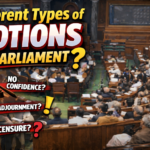CJI Surya Kant: Chief Justice of the Supreme Court

Justice CJI Surya Kant takes oath as the 53rd Chief Justice of the Supreme Court of India. President Droupadi Murmu administered the oath during a brief ceremony held at the Rashtrapati Bhavan.
LEARNING FROM HOME/WITHOUT CLASSES/BASICS
The original Constitution of 1950 envisaged a Supreme Court(SC) with a Chief Justice and 7 puisne Judges. Parliament has the power to increase this number.
The Supreme Court of India comprises the Chief Justice and 30 other Judges appointed by the President of India. Supreme Court Judges retire upon attaining the age of 65 years.
In order to appointed a Judge of the SC, a person
Must be a citizen of India.
Must have been, for at least five years, a Judge of a High Court or of two or more such Courts in succession.
Or an Advocate of a High Court or of two or more such Courts in succession for at least 10 years.
Or he must be, in the opinion of the President, a distinguished jurist.
Provisions exist for the appointment of a Judge of a High Court as an Ad-hoc Judge of the SC. Also, for retired Judges of the SC or HC to sit and act as Judges of that Court.
The Constitution seeks to ensure the independence of Supreme Court Judges in various ways. A Judge of the Supreme Court canno removed from office except by.
An order of the President passed after an address in each House of Parliament supported by a majority of the total membership of that House. And by a majority of not less than two-thirds of members present and voting. And presented to the President in the same Session for such removal on the ground of proved misbehaviour or incapacity.
A Judge of the SC debarred from practising in any court of law or before any other authority in India.
The Supreme Court has original, appellate and advisory jurisdiction. Its exclusive original jurisdiction extends to any dispute between the Government of India and one or more States. Or between the Government of India and any State or States on one side and one or more States on the other. Or between two or more States, if and insofar as the dispute involves any question (whether of law or of fact) on which the existence or extent of a legal right depends.
Article 32 of the Constitution gives an extensive original jurisdiction to the SC in regard to enforcement of Fundamental Rights. It is empowered to issue directions, orders or writs, including writs in the nature of habeas corpus, mandamus, prohibition, quo warranto and certiorari to enforce them.
The SC conferred with power to direct transfer of any civil or criminal case from one State High Court to another State High Court. Or from a Court subordinate to another State High Court.
The SC, if satisfied that cases involving the same or substantially the same questions of law are pending before it and one or more High Courts or before two or more High Courts and that such questions are substantial questions of general importance, may withdraw a case or cases pending before the High Court or High Courts and dispose of all such cases itself. Under the Arbitration and Conciliation Act, 1996, International Commercial Arbitration also initiated in the Supreme Court.
The appellate jurisdiction of the SC can be invoked by a certificate granted by the High Court concerned under Article 132(1), 133(1) or 134 of the Constitution in respect of any judgement, decree or final order of a High Court in both civil and criminal cases, involving substantial questions of law as to the interpretation of the Constitution.
Appeals also lie to the Supreme Court in civil matters if the High Court concerned certifies.
(a) that the case involves a substantial question of law of general importance.
(b) that, in the opinion of the High Court, the said question needs decided by the Supreme Court.
In criminal cases, an appeal lies to the Supreme Court if the High Court. (a) has on appeal reversed an order of acquittal of an accused person and sentenced him to death or to imprisonment for life or for a period of not less than 10 years.
(b) has withdrawn for trial before itself any case from any Court subordinate to its authority and has in such trial convicted the accused and sentenced him to death or to imprisonment for life or for a period of not less than 10 years.
(c) certified that the case is a fit one for appeal to the Supreme Court.
The SC has special advisory jurisdiction in matters which may specifically referred to it by the President of India under Article 143. Under Articles 129 and 142 , the SC vested with power to punish for contempt of Court. It include the power to punish for contempt of itself.






0 Comments